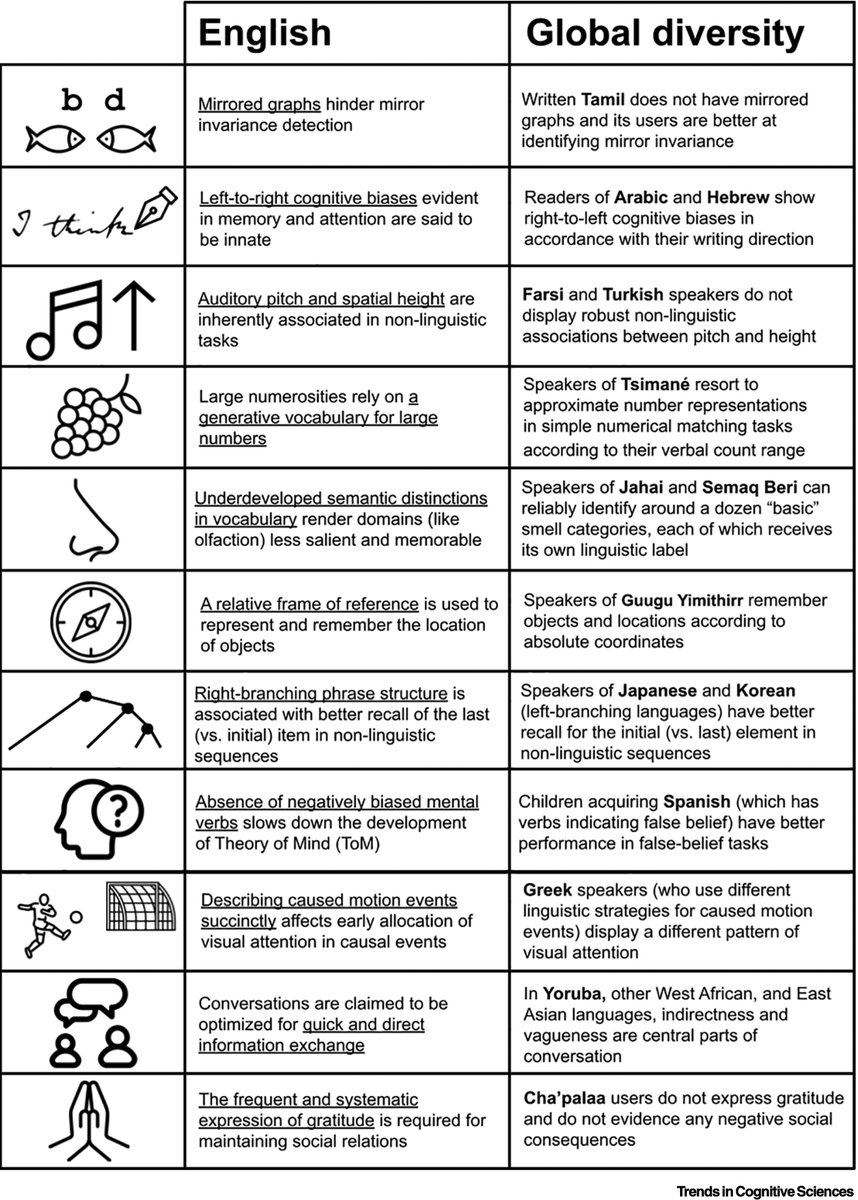
Asifa Majid
@asifa_majid
Investigating language, culture & cognition at @UniofOxford @OxExpPsy @StHughsCollege Find me on http://asifamajid.bsky.social
Over-reliance on English hinders cognitive science: it has led to premature claims of universality (due to over-sampling of English speakers) and limited the cognitive constructs being examined (due to the use of English as a meta-language). doi.org/10.1016/j.tics…

Open Encyclopedia of Cognitive Science launches Thematic Collections. #OECS is a free, open access resource for learning about the mind. Looking for great material to teach or just to dig into yourself? Start here. Ping us if you have ideas for more! oecs.mit.edu/themes

How are humans able to make sense of time? Not with special biology but with “time tools”—ideas, practices, and artifacts that render time more concrete. My new paper explores this vast toolkit—one that makes use of knots, nuts, hands, flowers, mountains, shadows, and more. 🧵
Thank you @mcxfrank and @asifa_majid for making the OECS happen, and @marina_bedny for section editing! Here is an article on the neuroscience of syntax: doi.org/10.21428/e2759…
We show that English grammar causes speakers to value future outcome higher than Dutch speakers. This suggests languages affect the way we make decisions about time, but undermines the mechanisms widely attributed to cause this. journals.plos.org/plosone/articl… @MKeithChen ?
Also highly recommend Shamanism by @mnvrsngh. It's so good I almost missed a train connection yesterday I was so engrossed! penguinrandomhouse.com/books/730339/s…
Steve Levinson's new book well worth a read. The Interaction Engine delves into social interaction across cultures, and explores the implications of it for everything from autism to the dynamics of populism. #OpenAccess doi.org/10.1017/978100…
Language and economic behaviour: Future tense use causes less not more temporal discounting. New paper, led by @ColebRob @aucksAdventures and Robin Dunbar doi.org/10.1371/journa…
HéLiCéO, the new project I am leading on Pacific languages, is hiring a postdoc researcher to document & describe a non-Austronesian language of Indonesia 🇮🇩 Applications are open till 1 May, job can start in June/July. Come work with us in Paris! ✨ heliceo.huma-num.fr/calendrier.htm…
NEWS: Professor Asifa Majid Named 2024 AAAS Fellow Congratulations to Prof Majid, recognised for outstanding contributions to understanding language, culture, and cognition, especially the relationship between language and sensory processing @OxExpPsy medsci.ox.ac.uk/news/professor…
Congratulations to the new 2024 AAAS Fellows class! They are a distinguished cadre recognized for their achievements across disciplines, including research, and teaching. aaas.org/news/aaas-welc…
A very enjoyable collaboration on bridging inclusivity and open science. Grateful to Sakshi Ghai for her leadership.
Psychology must embrace more responsible practices in design, reporting, generalisation, & evaluation of research to counteract the spectre of Questionable Generalisability Practices and the issue of MASKing (Making Assumptions based on Skewed Knowledge). nature.com/articles/s4427…
There are twin threats to psychology: the well-known HARKing (Hypothesising After the Results are Known) and the newly coined MASKing (Making Assumptions based on Skewed Knowledge). New paper led by @SakSGhai in @CommsPsychol nature.com/articles/s4427…

Psychology must embrace more responsible practices in design, reporting, generalisation, & evaluation of research to counteract the spectre of Questionable Generalisability Practices and the issue of MASKing (Making Assumptions based on Skewed Knowledge). nature.com/articles/s4427…
There’s a lot of discourse about smell on here these days, so I thought I’d draw attention to @asifa_majid’s wonderful work about smell preferences across cultures Key result: Smell preferences are strikingly invariant from one culture to the next cell.com/current-biolog…
Great piece by @mnvrsngh!
More people speak English today than any other language in human history. But what do we lose, psychologically and culturally, as a result? For this week’s @NewYorker, I explore how English shapes thought—from our conception of time to how we talk about the senses.
More people speak English today than any other language in human history. But what do we lose, psychologically and culturally, as a result? For this week’s @NewYorker, I explore how English shapes thought—from our conception of time to how we talk about the senses.
.@mnvrsngh considers how language can shape the ways we think and perceive the world amid English’s continued expansion into diverse regions around the world. nyer.cm/hZeyRVd
More opportunities to join us in Oxford! We have an open-rank position in Phonetics, to coincide with our move into the amazing Schwarzman Centre for the Humanities. The new Phonetics Lab sits above a concert hall - both acoustically shielded! ling-phil.ox.ac.uk/news/2024/12/1…
.@JudithHoller and I have written an entry on 'Conversation' for the new Open Encyclopedia of Cognitive Science edited by @mcxfrank and @asifa_majid. Happy to have contributed to such a fantastic resource! oecs.mit.edu/pub/gx9ypm4x/r…
Chapter on sign languages by the deaf linguist Carol Padden in the new Open Encyclopaedia of Cognitive Science, edited by @asifa_majid and Michael C Frank. oecs.mit.edu/pub/l60gyowl/r…
So happy to be a part of this great academic initiative (beating the bot: @oecs_bot) and on the massively important topic of Compositionality (oecs.mit.edu/pub/e222wyjy/r…) with the inimitable @ChrisGPotts. Thanks to @mcxfrank and @asifa_majid for the opportunity!